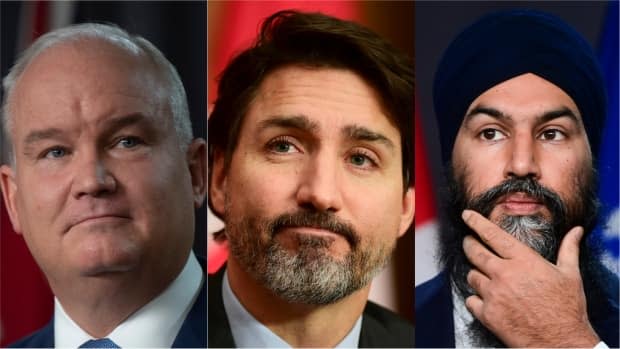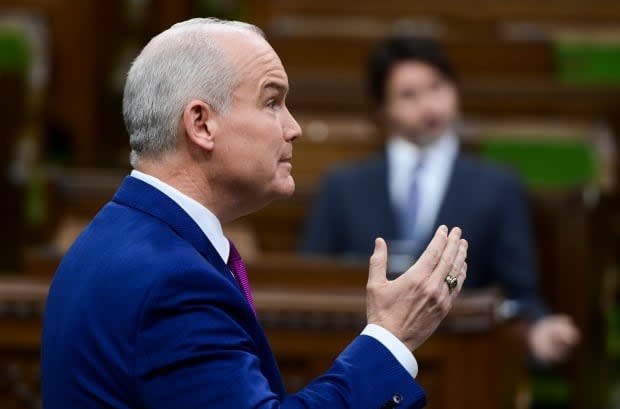Trudeau, O'Toole and Singh aren't all talking about the same problems

Speaking to the Liberal convention on Saturday afternoon, Prime Minister Justin Trudeau argued that politics should be about finding "real solutions" for the "real problems" and "real challenges" that people face.
"My friends, what it all comes down to is this," he said. "Which party has a real plan for the real problems in the real world?"
This sort of language at least grounds the government's agenda better than some of the loftier terms that have been floated about a post-pandemic world over the last year — and it is an implicit reminder that Conservative party members rejected a resolution acknowledging the reality of climate change at their own convention three weeks ago.
But it might also set up a debate about what really matters and what government should really concern itself with right now. Because, at the moment, the major parties are not all talking about the same problems.
In Trudeau's remarks on Saturday, he referenced a number of concerns that seem likely to feature in either the government's spring agenda or in the Liberal party's next election platform — improving long-term care, fighting inequity and injustice, combating climate change and building a cleaner economy. Liberals would also no doubt rank child-care, which was the subject of Finance Minister Chrystia Freeland's keynote remarks on Friday night, at or near the top of that list.
The New Democrats, as evidenced by NDP Leader Jagmeet Singh's speech to his party's convention on Sunday afternoon, are broadly interested in the same things, though they cast doubt on the Liberal government's commitment to such issues and contend that only by electing more New Democrats to the House of Commons can Canadians hope to see those concerns adequately addressed. But the NDP would also go further — forgiving significant amounts of student debt and implementing a wealth tax.
(Trudeau's choice to talk about "real" solutions might be a pre-emptive attempt to suggest that the NDP's proposals are more fanciful.)
Tories push back at reimagining the economy
Erin O'Toole's Conservatives, meanwhile, are largely concerned with other things.
When O'Toole spoke to the Conservative convention in March, he laid out a broad "recovery plan" that emphasized new laws for ethical accountability and transparency in government, new funding for mental health supports, preparing for the next pandemic and controlling government spending. He alluded to bolstering the domestic manufacturing sector and standing up to China, and lamented that it was not easier to build pipelines.
Several of those items, it might be noted, would speak to either real or purported weaknesses for the Trudeau government.
O'Toole did speak about climate change in his prepared remarks to Conservatives. But he seemed to think he still needed to convince his own party of the issue's salience — "We must also recognize that Canadians expect us to have a real plan for the environment," O'Toole told Conservatives — and the concern was ultimately framed as separate and secondary.
"As important as climate change is, getting our economy back on track is more important," O'Toole said.

Just a half hour after Trudeau concluded speaking to Liberals on Saturday afternoon, O'Toole participated in a question-and-answer session at a conference organized by the Canada Strong and Free Network (formerly known as the Manning Centre). Referring to programs like pharmacare, child care and a universal basic income (which some Liberal supporters are eager to pursue, though the Trudeau government has expressed only passing and vague interest), O'Toole said that, "Canadians know that that's not affordable" — and that seems likely to be a prominent part of the Conservative response to next week's federal budget.
"When the budget is going to be presented, (we want to) separate what is necessary in terms of COVID, and what is their pet projects in terms of 'reimagining the economy,'" a Conservaitve source told the Toronto Star last week.
A debate about problems
Liberals would no doubt argue that child care is not just affordable, but necessary. And the Trudeau government might also lean on a narrative that says their concerns and priorities are informed by the lessons of the pandemic — that there is a natural segue between fighting a pandemic and then enhancing social support and confronting climate change in the post-pandemic world.
O'Toole, on the other hand, contends that his approach will offer "security" and "certainty."
Some amount of partisan differentiation is inevitable. Speaking to Liberals, Trudeau touted his government's actions on gun control. Under questioning from conservative columnist Brian Lilley, O'Toole ended up talking about cutting the CBC's budget and preventing rail blockades. Parties will naturally gravitate to issues on which they think they have an advantage and promises aimed at narrow audiences will eventually recede to the obscure corners of election platforms.
Some amount of convergence is also likely — on mental health or pandemic preparedness, for instance.
A perfectly rational person might look at all of the issues being raised by the major parties and conclude that, in the real world, all of them are of some relevance — and there is at least broad multi-partisan agreement that some amount of economic repair will be necessary as the pandemic recedes.
But from the left and the right there are currently very different ideas about what should be foremost in the post-pandemic debate. Should it be about child-care, climate change and inequality? Or should it be about ethics, China and government debt?
Rather than a debate about competing solutions to widely agreed-upon problems, there seems for now to be a debate about which problems the country should prioritize.
To some degree or another, the parties might soon start trying to address each other's problem. But if an election were to occur anytime soon, it might be about whose choice of problems seems more real.

